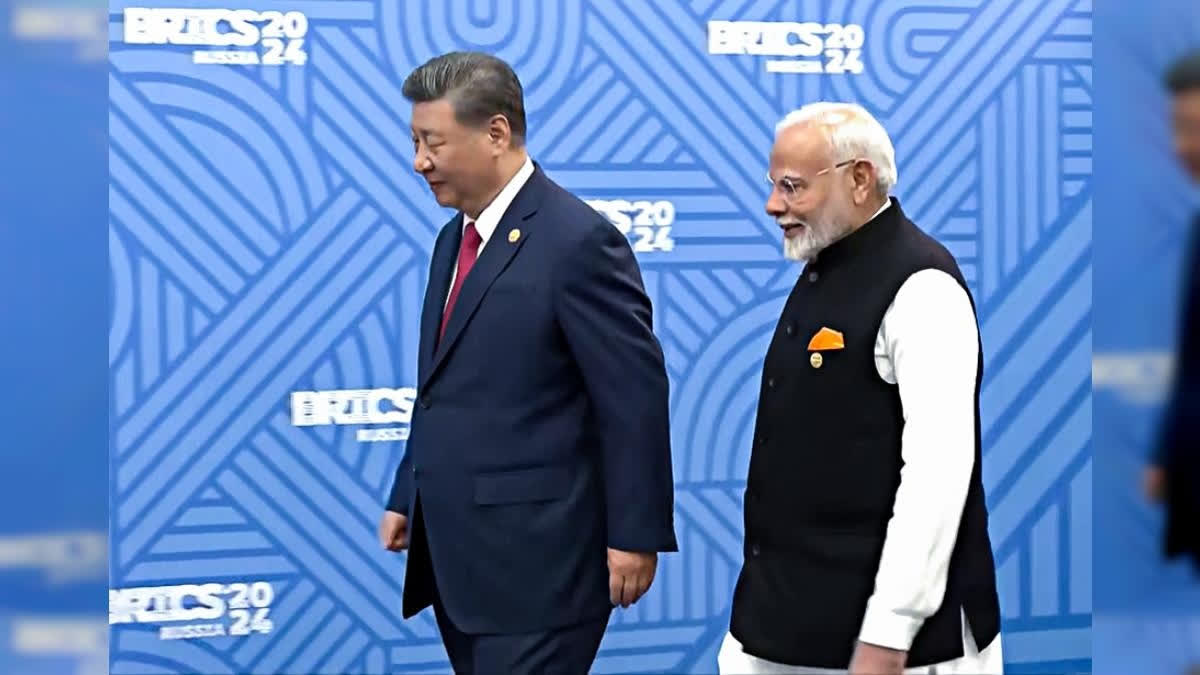New Delhi: India and China began disengagement in Depsang Plains and Demchok in the Eastern Ladakh sector on Monday, which is set for completion by October 29.
In conversation with ETV Bharat, Professor of China Studies at Jawaharlal Nehru University, New Delhi, Srikant Kondapalli said, "It is a positive development because the situation at the border has been an impasse for over four years, with only trade moving forward while visa issuances have completely stalled."
"This lack of progress not only hampers relations but also places a heavy financial burden on both nations due to substantial investments in military infrastructure. So, there was a need to take a call for an urgent assessment of the overarching issues at play," said Kondapalli.
"India's position, as clearly articulated by (External Affairs Minister S) Jaishankar, is that until peace and tranquillity are restored, there can be no meaningful bilateral relationship, a stance reinforced after the Galwan incident in June 2020. What we see now is not just a national focus, but a comprehensive government strategy, reflecting India's commitment to stand firm through mobilisation.
"This has put significant pressure on China, which is also dealing with multiple conflict zones, including Taiwan and the South China Sea. While discussions have recently highlighted specific friction points— Depsang plains and Demchok — there is potential for broader conversations if India applies consistent pressure”, he added.
According to sources, the completion of the disengagement process along the India-China border will be formally announced once troops from both nations conduct a thorough verification of the removal of military structures in eastern Ladakh.
Earlier this week, in a significant diplomatic achievement, India successfully negotiated an agreement with China regarding patrolling the Line of Actual Control (LAC). This breakthrough comes in the wake of strained relations that escalated after the fierce clash in Galwan Valley in June 2020, which marked a serious turning point in military tensions between the two countries. As a result, the process of troop disengagement is now actively progressing at two critical friction points in eastern Ladakh.
Further, Kondapali said, "Recent high-level meetings, such as the one in Kazan, are paving the way for disengagement through designated special representatives — a framework established in 2003, with 22 rounds of talks completed by 2019. Presently, the focus remains on patrolling and disengagement, rather than outright de-escalation, an agreement reached by defence ministries earlier."
"India is steadfast in its demand that tangible results must be achieved in disengagement before any discussions on broader bilateral issues can occur. This distinction is critical; resolving border tensions cannot be conflated with overall diplomatic relations, and India insists on resuming routine patrols before 2020," added Kondapali.
"China's potential to stall these crucial processes could dramatically impact relations, driven by nationalism and the significant role of the People's Liberation Army in China's civil-military dynamics. Therefore, India must prioritise patrolling and disengagement to secure lasting stability," he noted.
India-China patrolling to resume this month
Both nations are on track to resume patrolling by October 2024, restoring the operational arrangements as they existed in April 2020, before the border standoff escalated. This renewed patrolling will feature armed personnel and involve dismantling all temporary structures, including makeshift sheds and tents, as part of the disengagement process. During a high-level meeting at the BRICS Summit, Prime Minister Narendra Modi and President Xi Jinping reinforced their commitment to this agreement, emphasising the necessity of stability along the border.
What did EAM Jaishankar say?
External Affairs Minister S. Jaishankar characterised the disengagement of troops at Depsang and Demchok as the vital first step toward reestablishing peace, with the goal of reverting to the patrolling practices of 2020. He stressed that de-escalation will only be pursued once India has concrete assurances that the same measures are being implemented by China.



